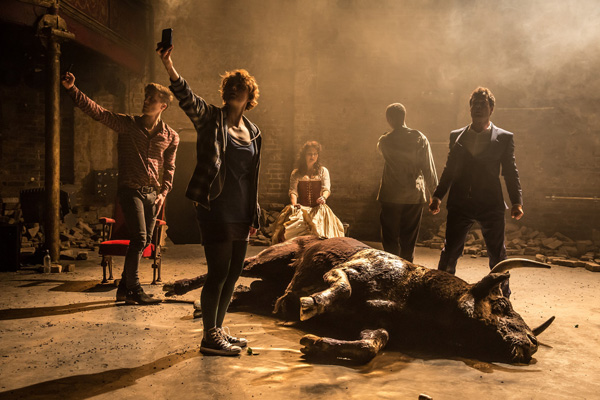Carmen Disruption, Almeida Theatre | reviews, news & interviews
Carmen Disruption, Almeida Theatre
Carmen Disruption, Almeida Theatre
Simon Stephens’s new deconstruction of Bizet’s opera is strangely, feverishly beautiful

Playwright Simon Stephens has made a long journey. Starting off as a young in-yer-face writer, then pausing to mellow over slices of life, then winning awards with state-of-the-nation family dramas and teen plays, he has ended up by brilliantly adapting The Curious Incident of the Dog in the Night-Time. And yet.
What’s he done? Well, he’s taken the original, put it on a wooden table and smashed it with a hammer into a hundred pieces. Then, after talking over four days with the mezzo-soprano Rinat Shaham (who has played the role of Carmen 400 times in more than 40 productions worldwide), he has taken bits of Bizet’s original, smeared them with petrol, and then with lubricant, and built a small pyramid that smells of the contemporary, while gleaming with the deep darkness of an iPhone screen.
A great mash-up of a classic perfect for the age of the selfie
The resulting play has five solitary characters, whose names will be familiar to opera lovers, but whose lives are very different. Carmen is a rent boy; Don José is a female cab driver with a dodgy sideline in crime; Micaëla is a lost teen who feels suicidal; Escamillo is a global trader; and the Singer is an opera star who sings one role so often that she has almost become a globe-trotting robot. The setting is an anonymous European city, which looks the same as anywhere else, and the time is now.
Music is provided by mezzo-soprano Viktoria Vizin and two cellists, Jamie Cameron and Harry Napier, and Bizet’s familiar tunes are given new lyrics and relayed in snatches. Just occasionally, a few lines of the original are sung (with translations popping up as surtitles). Centre stage, designed by Lizzie Clachan, lies a life-sized dying bull (pictured below), whose huge body gently rises and falls with his breathing. This is definitely a disrupted, a fractured Carmen.
Its central theme is loneliness. Although the characters bump into each other as they speed around the city, their paths cross, but they connect only momentarily. Each person is trapped in their skins; each attempts to reach out; each fails. Because of this, they narrate their stories directly to the audience, barely interacting, telling rather than showing. At its best, Stephens’s text pulses with urban rhythms, its images and sounds glowing like neon. Emotion meshes perfectly with story and sense. It’s a love letter to the city break.
 Some moments – as when Don José suddenly feels that she is known and understood when the person she is having tea with pours just the right amount of sugar into her cup – have a hallucinatory intensity. There is a description of a motorbike accident that is horrifically vivid. And, in Michael Longhurst’s superb production, there are passages – the glitterball, Roy Orbison singing “It’s Over” while the words roll by as surtitles, John Light’s Escamillo giving out a spine-chilling roar – when the music, words and story blend in a kind of strange and powerful perfection. “Lonely sunsets after all...” Indeed.
Some moments – as when Don José suddenly feels that she is known and understood when the person she is having tea with pours just the right amount of sugar into her cup – have a hallucinatory intensity. There is a description of a motorbike accident that is horrifically vivid. And, in Michael Longhurst’s superb production, there are passages – the glitterball, Roy Orbison singing “It’s Over” while the words roll by as surtitles, John Light’s Escamillo giving out a spine-chilling roar – when the music, words and story blend in a kind of strange and powerful perfection. “Lonely sunsets after all...” Indeed.
At its worst, the text is occasionally a touch too declamatory and its piling up of contemporary references to the digital world can feel predictable, banal and déjà vu. Surely it’s possible to have an alienated relationship today that doesn’t involve internet sex. Isn’t it? There’s also something dark and disturbing about spending 90 minutes in the presence of five characters who are almost blatantly unsympathetic, but perhaps that is the point.
As far as adaptations are concerned, I have often bemoaned the timidity of British theatres – and advocated a much more radical attack on original texts. This deconstruction is so thorough and so extreme that it feels like my prayers have been answered (and, talking about Continental theatre, I was not surprised to see that this project had originated at the Deutsche Schauspielhaus in Hamburg last year). With a hard-working and convincing cast that includes Sharon Small (Singer), Jack Farthing (Carmen), Noma Dumezweni (Don José) and Katie West (Micaëla), this is a great mash-up of a classic which feels perfect for the age of the selfie.
rating
Buy
Explore topics
Share this article
Add comment
The future of Arts Journalism
You can stop theartsdesk.com closing!
We urgently need financing to survive. Our fundraising drive has thus far raised £49,000 but we need to reach £100,000 or we will be forced to close. Please contribute here: https://gofund.me/c3f6033d
And if you can forward this information to anyone who might assist, we’d be grateful.

Subscribe to theartsdesk.com
Thank you for continuing to read our work on theartsdesk.com. For unlimited access to every article in its entirety, including our archive of more than 15,000 pieces, we're asking for £5 per month or £40 per year. We feel it's a very good deal, and hope you do too.
To take a subscription now simply click here.
And if you're looking for that extra gift for a friend or family member, why not treat them to a theartsdesk.com gift subscription?
more Theatre
 Little Brother, Soho Theatre review - light, bright but emotionally true
This Verity Bargate Award-winning dramedy is entertaining as well as thought provoking
Little Brother, Soho Theatre review - light, bright but emotionally true
This Verity Bargate Award-winning dramedy is entertaining as well as thought provoking
 The Unbelievers, Royal Court Theatre - grimly compelling, powerfully performed
Nick Payne's new play is amongst his best
The Unbelievers, Royal Court Theatre - grimly compelling, powerfully performed
Nick Payne's new play is amongst his best
 The Maids, Donmar Warehouse review - vibrant cast lost in a spectacular-looking fever dream
Kip Williams revises Genet, with little gained in the update except eye-popping visuals
The Maids, Donmar Warehouse review - vibrant cast lost in a spectacular-looking fever dream
Kip Williams revises Genet, with little gained in the update except eye-popping visuals
 Ragdoll, Jermyn Street Theatre review - compelling and emotionally truthful
Katherine Moar returns with a Patty Hearst-inspired follow up to her debut hit 'Farm Hall'
Ragdoll, Jermyn Street Theatre review - compelling and emotionally truthful
Katherine Moar returns with a Patty Hearst-inspired follow up to her debut hit 'Farm Hall'
 Troilus and Cressida, Globe Theatre review - a 'problem play' with added problems
Raucous and carnivalesque, but also ugly and incomprehensible
Troilus and Cressida, Globe Theatre review - a 'problem play' with added problems
Raucous and carnivalesque, but also ugly and incomprehensible
 Clarkston, Trafalgar Theatre review - two lads on a road to nowhere
Netflix star, Joe Locke, is the selling point of a production that needs one
Clarkston, Trafalgar Theatre review - two lads on a road to nowhere
Netflix star, Joe Locke, is the selling point of a production that needs one
 Ghost Stories, Peacock Theatre review - spirited staging but short on scares
Impressive spectacle saves an ageing show in an unsuitable venue
Ghost Stories, Peacock Theatre review - spirited staging but short on scares
Impressive spectacle saves an ageing show in an unsuitable venue
 Hamlet, National Theatre review - turning tragedy to comedy is no joke
Hiran Abeyeskera’s childlike prince falls flat in a mixed production
Hamlet, National Theatre review - turning tragedy to comedy is no joke
Hiran Abeyeskera’s childlike prince falls flat in a mixed production
 Rohtko, Barbican review - postmodern meditation on fake and authentic art is less than the sum of its parts
Łukasz Twarkowski's production dazzles without illuminating
Rohtko, Barbican review - postmodern meditation on fake and authentic art is less than the sum of its parts
Łukasz Twarkowski's production dazzles without illuminating
 Lee, Park Theatre review - Lee Krasner looks back on her life as an artist
Informative and interesting, the play's format limits its potential
Lee, Park Theatre review - Lee Krasner looks back on her life as an artist
Informative and interesting, the play's format limits its potential
 Measure for Measure, RSC, Stratford review - 'problem play' has no problem with relevance
Shakespeare, in this adaptation, is at his most perceptive
Measure for Measure, RSC, Stratford review - 'problem play' has no problem with relevance
Shakespeare, in this adaptation, is at his most perceptive
 The Importance of Being Earnest, Noël Coward Theatre review - dazzling and delightful queer fest
West End transfer of National Theatre hit stars Stephen Fry and Olly Alexander
The Importance of Being Earnest, Noël Coward Theatre review - dazzling and delightful queer fest
West End transfer of National Theatre hit stars Stephen Fry and Olly Alexander

Comments
A series of vignettes of